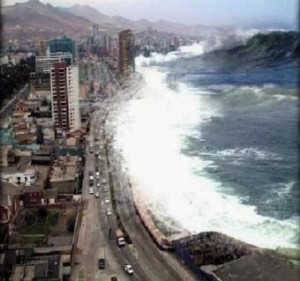ABIR: Politicians Must Avoid Policy Disasters
 In a technologically advanced and interconnected world, protectionist leaders in the US and other countries need to recognise that in order to cover the costs of calamities they require international risk-spreading and reinsurance, the head of the Association of Bermuda Insurers [ABIR] argued recently.
In a technologically advanced and interconnected world, protectionist leaders in the US and other countries need to recognise that in order to cover the costs of calamities they require international risk-spreading and reinsurance, the head of the Association of Bermuda Insurers [ABIR] argued recently.
Bradley Kading is president and executive director of the Association of Bermuda Insurers & Reinsurers, which represents the policy interests of Bermuda’s large insurers and reinsurers around the world.
In a recent essay on the global role of catastrophe re/insurers — many of them based in Bermuda — Mr. Kading said the shortcomings of Japan’s policy towards overseas re/insurers were shown up in the aftermath of recent back-to-back catastrophes.
“After Japan suffered an earthquake, tsunami [pictured] and nuclear power plant emergencies in March, it became apparent that the country’s lack of a global network of insurance and reinsurance has and will continue to hinder its recovery, reinforcing the need for global reinsurance,” said Mr. Kading.
“Beset by a triple tragedy — an earthquake, a tsunami and nuclear power plant emergencies — the people of Japan are inspiring admiration around the world.
“People everywhere are in awe of the stoicism of the residents of the affected areas and the resilience of the entire society.
But the aftermath of the disaster also underscores some of the failures of the Japanese government’s approach to the catastrophe insurance market, said Mr. Kading especially when compared with other nations that have endured their own calamities recently.
“While the estimated economic cost of the disasters in Japan likely will exceed $300 billion, insured losses making their way into the international insurance market probably will be only $20 billion to $40 billion, with maybe an additional $10 billion for business interruption,” he said.
“In contrast, much larger shares of the damage from recent natural disasters in Australia and New Zealand will be covered by international insurance, as was damage from US disasters during the past 10 years.
“The differing experiences of Japan, on one hand, and Australia, New Zealand and the US, on the other, underscore the importance of using a global network of insurance and reinsurance — backup insurance — to protect homes, businesses and public buildings at risk from natural and man-made disasters.”
Mr. Kading said at a time when Japan’s economy is reeling from the March catastrophes, the countrys taxpayers will shoulder much of the burden for the losses — comparing the situation to the US National Flood Insurance Programme, which also doesn’t buy reinsurance and now has a deficit of $18 billion.
“In contrast, in floods and typhoons in Australia and earthquakes in Chile and New Zealand, more than two-thirds — and up to 90% for some individual insurance companies — of the losses were ceded to international reinsurers,” he said. “In fact, New Zealand is receiving such large payments from foreign reinsurers that its balance of payments has been pushed into positive territory for the first time in years.
“Similarly, in the United Sates, Hurricane Katrina in 2005 caused total losses of $125 billion, with insured losses amounting to $62.2 billion, of which foreign insurers and reinsurers paid more than 60 percent.
“Amd in the aftermath of the 2001 terrorist attacks on New York [pictured below], international insurance and reinsurance firms paid 64% of the estimated $27 billion in US payouts for the claims.
“After Hurricane Ike in 2008, the Texas Windstorm Insurance Association said more than 80% of the $1.5 billion in resulting reinsurance payments were from non-US reinsurers, with $1 billion coming from Bermuda-based reinsurers.”
Mr. Kading said public policies should encourage international reinsurance, not discourage it through the punitive taxes that some in Congress are proposing, or restrictive policies such as those in Japan or proposed in the US for managing flood, hurricane or earthquake risks.
“A proposal in President Barack Obama’s budget, based on legislation introduced by Massachusetts Congressman Richard Neal would levy an unnecessary tax that threatens international reinsurance in the United States,” he said.
“By creating an uneven playing field, non-US insurers and reinsurers will be at a competitive disadvantage. In addition, an economic study conducted by the Brattle Group Inc. demonstrated that the tax risks a 20% reduction in the supply of reinsurance in the United States.
“This tax would harm insurance capacity, increase insurance costs and shut many US residents out of the international reinsurance pool that protects them.
“Many natural disasters can’t be predicted or prevented, but there’s no reason for disastrous public policies.


